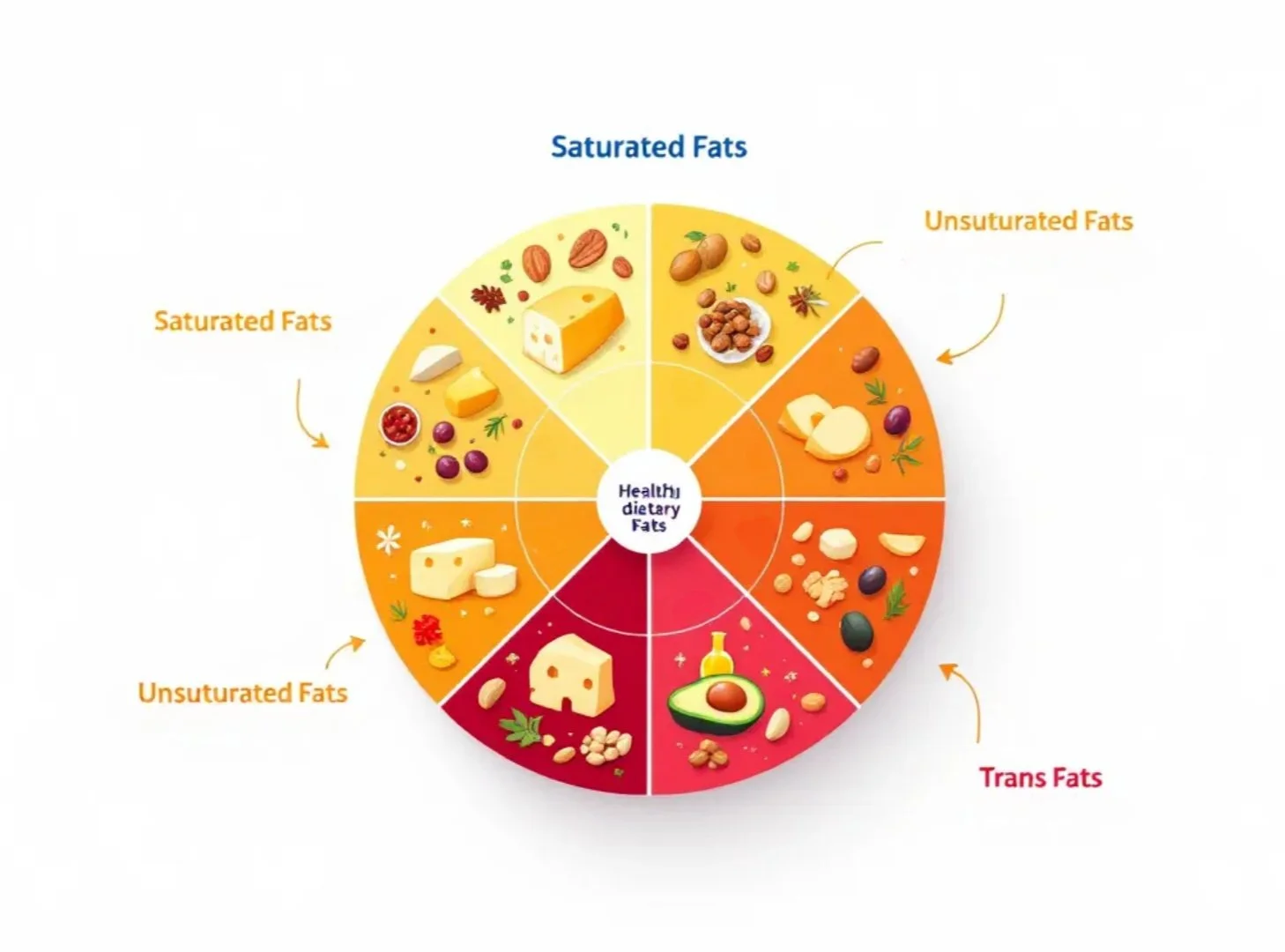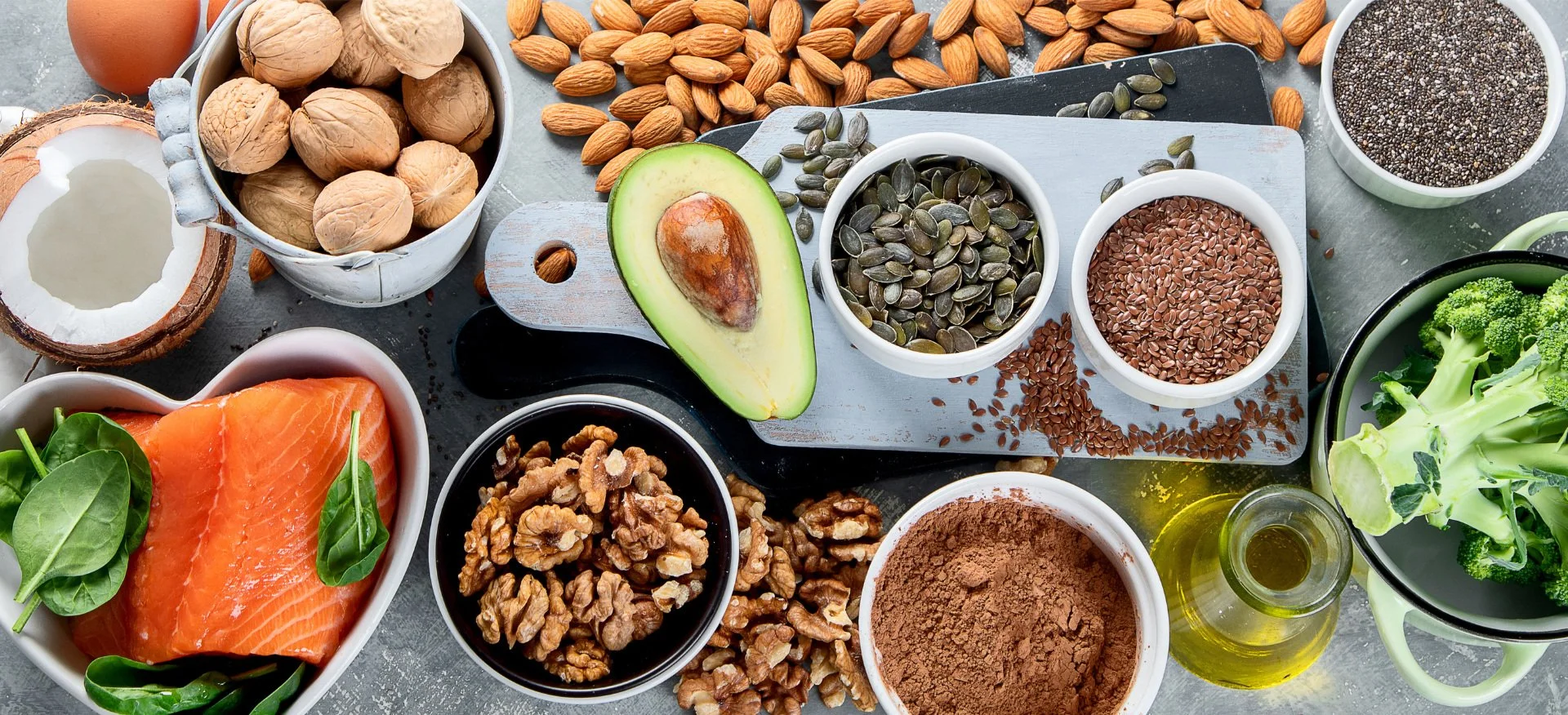Understanding the Type of Fats: A Quick Guide to Healthy Choices
Dietary fats are vital for energy, hormone production, and nutrient absorption, but not all fats contribute equally to good health. The challenge lies in distinguishing between harmful fats, like saturated and trans fats, which can raise bad cholesterol and increase heart disease risk, and beneficial ones, such as monounsaturated and polyunsaturated fats, that support heart health and overall wellness. Understanding these differences is key to making informed dietary choices. This guide explores the types of fats, their impact on health, and practical ways to incorporate healthier fats options into your diet for long-term benefits.
Key Takeaways
Dietary fats are essential for energy, hormone production, and nutrient absorption, with a balanced intake crucial for overall health.
Trans fats and saturated fats can increase the risk of heart disease, while monounsaturated and polyunsaturated fats are beneficial for lowering LDL cholesterol.
Incorporating healthy fats such as omega-3 fatty acids through diet, like fatty fish and nuts, can significantly improve cardiovascular health.
The Importance of Dietary Fats
Our bodies rely heavily on dietary fats for various essential functions that ensure our system operates optimally. As a dense source of energy, they provide 9 calories per gram—more than twice the amount available from proteins or carbohydrates—which is crucial for fueling both basic physiological processes and daily activities.
Fats are not only important for energy but also play an indispensable role in hormone production and the absorption of nutrients. They assist in regulating several bodily operations such as metabolism, growth, and reproductive health through hormones. To absorb and make use of vitamins A, D, E, and K the body absorb them, which are fat-soluble. The presence of fats is necessary [1].
It’s vital to have healthy fats within one’s diet to promote overall wellness while reducing the risk of chronic illnesses. Polyunsaturated fats are beneficial dietary fats that encompass essential fatty acids like omega-3s and omega-6s – compounds our body cannot synthesize independently [2]. Recognizing which types constitute healthy versus unhealthy fats stands as fundamental when pursuing a balanced diet conducive to lasting health benefits.
Types of Dietary Fats
The various types of dietary fats are not all alike in their composition or impact on health. These fats fall into four main categories: saturated fats, trans fats, monounsaturated fats, and polyunsaturated fats. Recognizing the differences between these fat types is crucial due to their distinct chemical structures and corresponding effects on our well-being.
Often regarded as detrimental to health, saturated and trans fats have been implicated in elevated levels of LDL cholesterol (often referred to as “bad” cholesterol), which increases the risk for heart disease [3]. Conversely, monounsaturated and polyunsaturated fats are acknowledged as healthy alternatives replacing saturated fats that can reduce LDL cholesterol while supplying vital essential fatty acids necessary for bodily functions.
Taking a closer look at each category reveals more about their unique characteristics.
Saturated Fats
Saturated fats typically remain solid at room temperature, earning them the nickname “solid fats.” These fats can be found abundantly in animal products such as meat and dairy, along with tropical oils like coconut and palm oil [4].
Ingesting excessive saturated fat has been linked to a higher risk for heart disease due to its potential role in increasing ‘bad’ cholesterol levels or low-density lipoprotein (LDL) cholesterol. This increase may contribute to the accumulation of fatty deposits within the arteries, heightening cardiovascular risks.
To mitigate health risks associated with heart disease, dietary guidelines suggest limiting your intake of saturated fat to under 10% of total daily caloric consumption. For someone following a standard 2,000-calorie diet regimen, this equates to restricting intake of saturated fat to roughly 20 grams each day [5]. Substituting monounsaturated and polyunsaturated fats for their saturated counterparts is often advocated by health professionals as a way toward enhancing overall heart health.
Trans Fats
Trans fat is synthetically manufactured by converting liquid vegetable oils into a more solid form through a process known as hydrogenation. This procedure gives rise to trans fats, which are frequently found in various types of food, such as snacks, fried items, and baked goods [6].
These fats pose significant health risks because they have the capacity to elevate levels of LDL cholesterol while simultaneously reducing high-density lipoprotein (HDL) cholesterol – often referred to as ‘good’ cholesterol. Such changes contribute greatly to an enhanced risk for heart disease along with other serious cardiovascular disease issues [7].
For optimal heart health, it’s vital to avoid trans fats. This can be achieved by scrutinizing product ingredients for any mentions of hydrogenated or partially hydrogenated oils replacing saturated fat. The World Health Organization has advocated eliminating these harmful fats from all foods worldwide owing to their negative impact on well-being. Consequently, minimizing consumption of trans fat is essential in preserving healthy cholesterol levels and preventing heart disease [8].
Monounsaturated Fats
Foods such as olive oil, avocados, and nuts contain monounsaturated fats. These fats possess a chemical structure with hydrogen atoms in one double bond that keeps them liquid at room temperature.
Monounsaturated fats play an essential role in heart health by reducing LDL (bad) cholesterol while preserving HDL (good) cholesterol levels. This important equilibrium aids in decreasing the risk of developing heart disease and helps to keep cardiovascular health intact [9].
Polyunsaturated Fats
Essential fatty acids, which the body is incapable of producing by itself, such as omega-3 and omega-6 fatty acids, are types of polyunsaturated fats. These important nutrients can be found in a variety of foods including oily fish as well as flaxseeds and walnuts [10].
Specifically noteworthy for their anti-inflammatory properties that contribute to lowering blood cholesterol levels, are omega-3 fatty acids. They hold significant importance in maintaining heart health and should therefore be incorporated into a balanced diet.
Given that these essential fatty acids cannot be synthesized by the body, it is imperative to include them through our diet. Consuming food items rich in polyunsaturated fat can greatly improve cardiovascular health along with overall wellness.
Healthy Fats and Heart Health
Elevated consumption of saturated and trans fats can adversely affect cholesterol levels, leading to a heightened risk of heart disease. Such as most trans fats are known for increasing LDL cholesterol, which is implicated in the onset of heart-related issues.
By switching from saturated and trans fats to more unsaturated fat varieties like monounsaturated and polyunsaturated fats, one can mitigate this health risk. These healthier types of fat have been linked with reductions in LDL cholesterol levels as well as enhancements in cardiac health.
Particularly advantageous for the heart are omega-3 fatty acids found abundantly in various kinds of fish and some plant-based foods. They play an essential role by diminishing inflammation along with bringing down cholesterol figures, rendering them critical elements within a diet that promotes cardiovascular wellness.
Diets exemplified by the Mediterranean style that emphasize an abundance of monounsaturated and polyunsaturated fats demonstrate effectiveness at cutting down heart disease incidence, especially among those living with diabetes [11]. Introducing such healthy fats into one’s eating habits can lead to substantial gains not only for cardiovascular fitness but also for overall health prosperity.
How Much Fat Should You Eat?
It is crucial to regulate the intake of dietary fat to sustain a well-balanced diet and reduce the risk of heart disease. For someone consuming 2,000 calories daily, it’s advised that saturated fat consumption should not exceed 20 grams, keeping it under 10% of total caloric intake in order to diminish potential health hazards. Due to their detrimental impact on health, trans fats have been prohibited in the United States, underscoring the importance of steering clear of them [12].
In efforts to better control your consumption of fats, make sure you scrutinize nutrition labels for both total fat and saturated fat content. To avoid trans fats successfully, ensure you are aware they may be present as hydrogenated or partially hydrogenated oils listed among ingredients—choosing wisely can lead to healthier eating habits.
Tips for Incorporating Healthy Fats into Your Diet
Opting for fatty fish such as salmon in place of red meat is a superb strategy to enrich your diet rich enough with healthy fats. Prepare the fish by baking and pairing it with vegetables on the side to create a meal rich in nutrients. Preparing homemade salad dressings using oils that are good for the heart, like those from olive or avocado, can elevate your dishes.
Incorporating elements like avocados, whole sunflower or pumpkin seeds, and olives into what you eat presents an effective means of obtaining essential fats that aid in curbing hunger pangs. Enhance sandwiches and smoothies with creamy avocados, add toasted sunflower seeds for a flavorful crunch in salads, and choose olives when desiring a savory nibble.
Finally, nuts along with nut butters serve as another avenue to augment one’s consumption of beneficial fats. Introduce nuts into your salads for added texture, spread wholesome nut butter over slices of whole grain bread, or mix ground flaxseed into yogurt or blend it within smoothies to secure an additional infusion of omega-3 fatty acids.
Common Misconceptions About Fats
There is a widespread misunderstanding that all fats are detrimental to one’s health. On the contrary, essential unsaturated fats like monounsaturated and polyunsaturated fats play a vital role in sustaining good health. The World Health Organization has emphasized this point by recommending the complete removal of trans fats from foods globally, highlighting the significance of selecting beneficial types of the fat in your diet.
It’s erroneously believed that choosing low-fat options invariably leads to healthier eating habits. Many low-fat products compensate for their lack of fat with added sugars or salt, which can negatively impact your well-being. To ensure you’re making healthy diet choices, it’s important to scrutinize nutrition labels meticulously since not every food marketed as ‘low fat’ is necessarily conducive to better health.
Summary
It is essential to grasp the distinctions among various dietary fats and their impact on health to make educated food decisions. Consumption of saturated and trans fats may elevate heart disease risk, but monounsaturated and polyunsaturated fats can confer several advantages for wellness, such as reducing bad cholesterol levels and diminishing inflammation.
To enhance your cardiac well-being substantially along with your overall health, integrate healthy fats into your meal planning while steering clear of harmful ones. Always review nutritional information carefully, select foods prudently, and adopt a balanced diet for an improved health trajectory.
Frequently Asked Questions
Which is better polyunsaturated fat or monounsaturated fat?
Perceived as healthier than polyunsaturated fat, monounsaturated fat can be found in beneficial sources such plant foods such as olive oil and canola oil.
These oils, when included in your diet, can efficiently promote overall health.
Why are dietary fats important?
Dietary fats are essential for providing energy, supporting cell function, and facilitating the absorption of vital vitamins. Their role in hormone production and overall health underscores their importance in a balanced diet.
What are the different types of dietary fats?
The four main types of dietary fats you should be aware of are saturated fats, trans fats, monounsaturated fats, and polyunsaturated fats.
Understanding these types helps you make informed dietary choices for better health.
How do trans fats harm health?
Trans fats pose a considerable threat to health as they elevate levels of LDL cholesterol and simultaneously reduce HDL cholesterol, thereby increasing the susceptibility to heart disease.
Reducing their intake is vital since most processed foods and fried foods frequently contain these harmful trans fats.
How much saturated fat should I consume daily?
Limit your saturated fat intake to less than 10% of your total daily calories, roughly 20 grams for a 2,000 calorie diet.
This helps maintain heart health and overall well-being.
Disclaimer
The information provided in this article is for educational and informational purposes only and is not intended as medical advice. While we work diligently to provide accurate and up-to-date information, we make no representations or warranties of any kind, express or implied, about the completeness, accuracy, reliability, suitability, or availability with respect to the content. The information contained herein should not be used as a substitute for the advice of an appropriately qualified and licensed physician or other healthcare provider. The suggestions and insights should not be used for diagnosing or treating a health problem or disease, or prescribing any medication. Always seek the advice of your physician or other qualified health provider with any questions you may have regarding a medical condition or treatment and before undertaking a new health care regimen. Never disregard professional medical advice or delay in seeking it because of something you have read on this site.
References
Additional Reading
Additional Resources
Related Products
ZroFat™ (pronounced zero fat) is a carbohydrate-based, plant-derived fat replacer made from chia mucilage and konjac glucomannan. These high-viscosity, non-toxic fibers mimic the texture, mouthfeel, and stability of traditional fats while offering a significant reduction in calories and saturated fat.
Reducing saturated fat and caloric intake while increasing fiber is crucial for preventing lifestyle diseases such as heart disease, diabetes, and obesity. High saturated fat consumption is linked to elevated cholesterol levels, which can contribute to cardiovascular problems. Lowering caloric intake helps manage body weight, reducing the risk of obesity-related conditions.
An significant use case use case for ZroFat™ is Hazelnut Spread. An astounding 77% reduction in calories, 4% increase in fibre, and 80% reduction in calories, when compared to conventional spreads.














